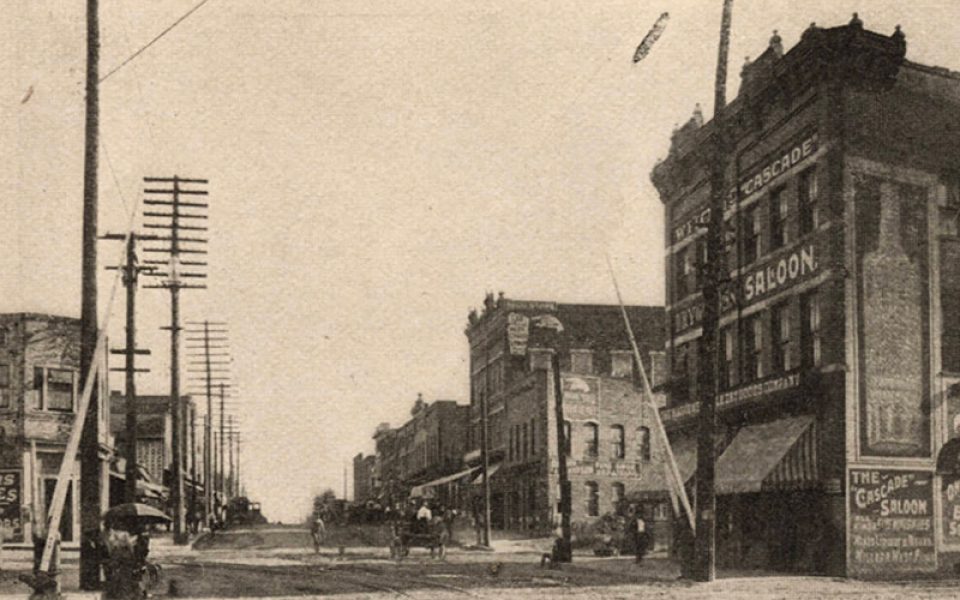The patrons at Oden Brewing in Greensboro mingled and talked while enjoying glass after refreshing glass of ales and lagers and stouts on the eve of the 100th anniversary of the passing of prohibition in the United States.
Nestled under the exposed wood ceiling and surrounded by dozens of drinkers lined up at Oden’s reclaimed bar, it’s hard to imagine what it must have been like all those years ago, a time that Winston Churchill once called “an affront to the whole history of mankind.”
And yet, by the time the 18th Amendment — which made the production, transportation and the sale of alcohol illegal, but not the actual consumption of it — had gone into effect, North Carolinians had been living a dry lifestyle for at least 10 years.
“North Carolina was the first state in the South to implement prohibition,” explains Erin Lawrimore, an archivist and associate professor at UNCG.
“My joke is that we were the first in flight and first to ban flights.”
Lawrimore works quickly to set up a public display table at Oden Brewing in Greensboro on Jan. 16 that chronicles the history of saloons and prohibition in the Triad. The pop-up exhibit is part of the university’s Hop Into History initiative that aims to bring the story of craft beer to the public.
“Archives have such a reputation of being stuffy,” says Lawrimore. “We wanted to take the archives out to where people are. We wanted to show what’s going on in the beer industry but also what has gone on.”
Much of the material comes from the university’s Well Crafted NC project, which documents the history of beer and brewing in the state. In addition to the pop-up exhibits that her department puts on at local breweries, interested scholars can find most of the information online at UNCG’s library website.
A gallery of historic images displays the plethora of breweries and saloons that once existed in the Triad.
As a gathering crowd takes in the information, the plinky notes from Scott Joplin’s “The Entertainer” punctuate the atmosphere, adding to the ambience.
Excitedly, Lawrimore explains how recent archival documents revealed that the Triad may have been the home to the state’s first brewery, a Moravian outfit built in Bethabara just outside of Winston-Salem in 1756. More than a century later, downtown Greensboro, particularly up and down Elm Street, would be dotted by an array of saloons, each claiming to sell the best beer around.
One location in particular at the junction of South Elm Street, Smothers Place and MLK Jr. Drive might look familiar to residents.

The Cascade Saloon, located at 410 S. Elm St., was one of the first saloons in Greensboro, according to the display. An interactive image on the UNCG library’s website lets users scroll across an archival photo of the building and watch it as it changes to the building that stands on the corner today. Another black-and-white photo nearby shows a saloon owned and operated by CC Shoffner in the early 1900s. More than a century later, that same location would house Little Brother Brewing.
Despite the city’s booming beer industry, a stronger force was gradually working to eliminate alcohol entirely.
Further down the table, newspaper clippings and old ads show the appearance of famous prohibitionist Carrie A. Nation on one of her national tour stops in Greensboro.
“Carrie Nation, the Kansas Saloon Smasher, will appear at Lindley Park Casino,” the ad announces. Admission was 10 cents, and according to the exhibit, Nation referred to Salisbury as the “whiskeyest-soaked city in the United States” outside of Chicago, and called Salisbury a “hell hole” with “plenty of saloons, and every one of them is a ticket office to hell.”

-

An ad in The Greensboro Patriot, July 24, 1907 (courtesy of UNCG archives) -

Carrie Nation with an axe
Lawrimore explains that Nation, who was well known for taking a hatchet to whiskey casks during her rounds, sold trinkets and even little hatchets at her talks like she was some kind of ultra-conservative, angry, hatchet-wielding superstar.
A devout Christian, Nation opposed almost anything that brought people joy, Lawrimore says, including smoking.
An hour into the pop-up, attendees gather around the display, pointing out important dates or scrolling through the online archives on an iPad.
“I think it’s really interesting,” says Josh Sherrick, who visited the brewery to see the exhibit. “You get an understanding of the Bible Belt and how much they hated booze.”
And yet, 100 years later, North Carolina’s craft beer industry grows stronger each year.
According to the North Carolina Craft Brewers Guild, the state boasts the largest number of craft breweries in the south, with more than 300 breweries and brewpubs.
Lawrimore says that delving into the state’s rich beer history not only helps put the industry into context, but also serves as a way to teach about larger movements in history like Civil Rights and the women’s movement.
“Everybody gets really jazzed to learn about beer,” she says. “Beer is an important part of our history here whether it’s drinking it or banning it.”
To learn more about Well Crafted NC and future Hop Into History events, visit wellcraftednc.com.
Join the First Amendment Society, a membership that goes directly to funding TCB‘s newsroom.
We believe that reporting can save the world.
The TCB First Amendment Society recognizes the vital role of a free, unfettered press with a bundling of local experiences designed to build community, and unique engagements with our newsroom that will help you understand, and shape, local journalism’s critical role in uplifting the people in our cities.
All revenue goes directly into the newsroom as reporters’ salaries and freelance commissions.


This is very interesting. The link to the archive on the UNCG site is wrong at the end of this article. It adds a .com at the end and should be corrected to this: https://library.uncg.edu/dp/wellcraftednc/